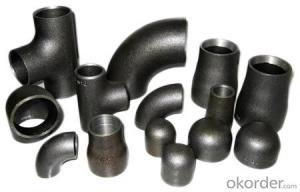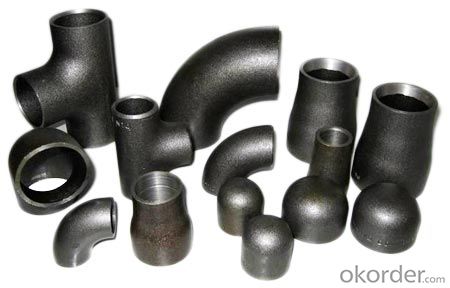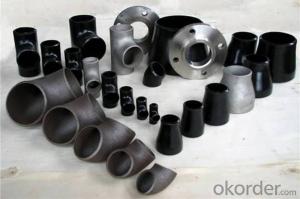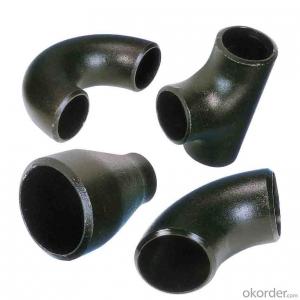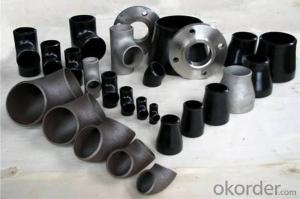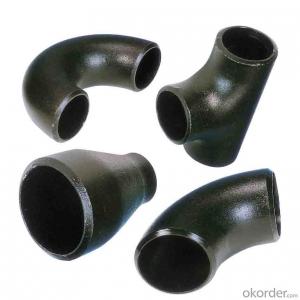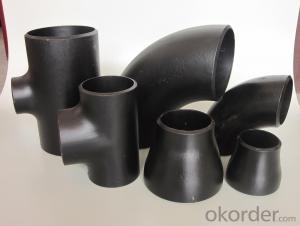32'' ELBOW TEE BEND FLANGE CARBON STEEL FITTINGS
- Loading Port:
- Tianjin
- Payment Terms:
- TT OR LC
- Min Order Qty:
- 5 m.t
- Supply Capability:
- 300 m.t/month
OKorder Service Pledge
OKorder Financial Service
You Might Also Like
Products Detailed Description
Products | pipe fittings elbows, bends,tees, reducers caps |
Size | 1/2" - 48" |
Wall thickness | Sch5-Sch160 XXS |
Standard | ANSI, ASME API5L, OCT, DIN and JIS, etc. |
we can also produce according to drawing and standards provided by customers. | |
Material | Carbon steel, alloy steel and stainless steel. |
We can produce according to materials appointed by consumers. | |
Packaging | Plywood Cases,plywood pallet, plastic bag or as customers requirement |
Surface Treatment | Shot blasted, rust-proof black oil |
Delivery Time | 10-60 days |
Quality | First grade |
Others | 1.Special design available according to your drawing. |
2.anti-corrosion and high-temperature resistant with black painting | |
3. All the production process are made under the ISO9001:2000 strictly. | |
4. A conformity rate of ex-factory inspection of products. |
Specifications
Ansi B16.9 WPB carbon steel pipe fitting elbow tee reducer
Size:Seamless 1/2"-24" Welded 1/2"-48"
ANSI B16.9 WPB carbon steel pipe fitting elbow tee reducer
1.Size: Seamless 1/2"-24" Welded 1/2"-48"
2. WT: SGP, STD, SCH40, SCH80, SCH100,SCH120,SCH160,XS,XXS
3. Material:
stainless steel Grade: 201,304,304L,316,316L,317,317L,904L,and etc
carbon steel Grade: WPB,GRB, Q235,16MN
Alloy steel: st35.8,st52,wp11,wp22,wp12 wp l6
4. Standard: ASTM/AISI/DIN/JIS
5. Type: Concentric and eccentric
6. Surface treatment: Transparent oil, rust-proof black oil
7. Applications range: Applications range: for use in the petroleum, smelting, foodstuff, power, papermaking, chemical, medical equipment,aviation, boiler heat exchanger, and other fields
8. Packing: wooden case or as per customers' requirement
- Q: Can steel pipes be used in earthquake-prone areas?
- Indeed, in areas prone to earthquakes, steel pipes have the potential to be employed. Steel, as a durable and sturdy material, possesses the capacity to endure the forces generated during an earthquake. The malleability and pliability of steel facilitate the absorption and dissipation of seismic wave energy, thereby decreasing the likelihood of structural failure. Furthermore, the ability to weld steel pipes enables the construction of resilient and earthquake-resistant edifices. Nevertheless, it is crucial to adhere to appropriate engineering and construction practices to guarantee the proper installation and connection of steel pipes, thereby maximizing their capacity to withstand earthquakes. Additionally, it is imperative to consider local building codes and regulations to ensure compliance and safety in earthquake-prone regions.
- Q: How are steel pipes used in the construction of chemical plants?
- Steel pipes are commonly used in the construction of chemical plants due to their excellent durability, strength, and resistance to corrosion. They are used to transport various chemicals, gases, and fluids throughout the plant, ensuring a safe and efficient flow. These pipes are also used for structural support, providing stability to the plant's infrastructure. Additionally, steel pipes are often used for the installation of heating, ventilation, and air conditioning systems, as well as for the construction of process equipment and storage tanks within the chemical plant.
- Q: How does the price of steel pipes vary based on market demand?
- The price of steel pipes varies based on market demand because when the demand for steel pipes is high, the prices tend to increase as suppliers can charge more for their products. Conversely, when the demand is low, the prices may decrease as suppliers may need to offer discounts or special deals to attract buyers. Essentially, the price of steel pipes fluctuates with changes in market demand.
- Q: What are the different methods of joining steel pipes for steam applications?
- Some common methods of joining steel pipes for steam applications include welding, threading, and flanging. Welding involves melting and fusing the pipes together, creating a strong and permanent connection. Threading involves cutting grooves into the ends of the pipes and screwing them together using threaded fittings. Flanging involves using a flange to connect the pipes, which is then bolted together for a secure and leak-free connection. Each method has its own advantages and considerations depending on the specific application and requirements.
- Q: Can steel pipes be used for transportation of hazardous materials?
- Steel pipes can indeed be used for the transportation of hazardous materials. Steel is known for its strength, durability, and resistance to corrosion, making it suitable for handling and transporting a wide range of hazardous substances. This includes flammable liquids, toxic chemicals, and other dangerous materials. Steel pipes used for the transportation of hazardous materials are often specially designed and constructed to meet stringent safety regulations and industry standards. They are typically made from high-quality steel alloys and undergo rigorous testing to ensure their integrity and resistance to leaks or ruptures. Furthermore, steel pipes can be manufactured with additional protective coatings or linings to provide an extra layer of security and prevent any potential reactions between the hazardous material and the steel. These coatings can also help to minimize the risk of corrosion and extend the lifespan of the pipes. Overall, steel pipes have a proven track record in the transportation of hazardous materials due to their inherent strength, durability, and ability to withstand the harsh conditions often encountered during transportation. However, it is crucial to follow proper handling, storage, and transportation protocols to ensure the safety of both the materials being transported and the individuals involved in the process.
- Q: How are steel pipes inspected for defects?
- Steel pipes are typically inspected for defects using various non-destructive testing methods such as ultrasonic testing, magnetic particle inspection, and visual inspection. These techniques help identify any cracks, corrosion, or other defects in the pipes, ensuring their structural integrity and quality.
- Q: What is the role of steel pipes in sewage systems?
- The role of steel pipes in sewage systems is to provide a durable and reliable means of transporting wastewater and sewage from homes, businesses, and other sources to treatment plants or disposal sites. Steel pipes are known for their strength, corrosion resistance, and longevity, making them suitable for withstanding the harsh and corrosive nature of sewage. They are capable of handling high-pressure flows and can withstand the weight and pressure of the surrounding soil. Additionally, steel pipes are often used in larger diameter applications due to their ability to carry larger volumes of sewage efficiently.
- Q: What are the different types of steel pipe connections for steam pipelines?
- There are several types of steel pipe connections commonly used for steam pipelines, including threaded connections, flanged connections, welded connections, and grooved connections.
- Q: Can steel pipes be used for aboveground applications?
- Yes, steel pipes can be used for aboveground applications. Steel pipes are known for their strength, durability, and resistance to corrosion, which makes them suitable for various aboveground applications. They are commonly used in industries such as construction, oil and gas, water transportation, and infrastructure development. Steel pipes can be used for aboveground applications such as structural supports, handrails, fencing, scaffolding, outdoor pipelines, and various other outdoor structures. Additionally, steel pipes can be coated or painted to provide further protection against weather conditions and enhance their aesthetic appearance. Overall, steel pipes are a versatile choice for aboveground applications due to their reliability and long-lasting performance.
- Q: What are the common maintenance practices for steel pipes?
- Common maintenance practices for steel pipes include regular inspections, cleaning, and corrosion prevention. Regular inspections are crucial to identify any signs of damage or wear. This can involve visual inspections, as well as non-destructive testing methods such as ultrasonic testing or magnetic particle inspection. Inspections should be carried out on a scheduled basis to ensure any issues are detected early on and can be addressed promptly. Cleaning is another important maintenance practice for steel pipes. This involves removing any dirt, debris, or scale that may accumulate both on the inside and outside of the pipes. Regular cleaning helps to prevent blockages, improve flow efficiency, and reduce the risk of corrosion. Corrosion prevention is a key aspect of maintaining steel pipes. Various methods can be employed to protect the pipes from corrosion, such as applying protective coatings, using cathodic protection systems, or implementing corrosion inhibitors. These measures help to extend the lifespan of the pipes and ensure their structural integrity over time. Other maintenance practices may include repairing or replacing damaged sections of the pipes, maintaining proper insulation to prevent heat loss or gain, and monitoring the pipes for any signs of leakage or pressure drops. Overall, regular inspections, cleaning, and corrosion prevention are essential maintenance practices for steel pipes. By implementing these practices, the lifespan of the pipes can be prolonged, and potential issues can be identified and addressed before they cause significant damage or disruptions.
Send your message to us
32'' ELBOW TEE BEND FLANGE CARBON STEEL FITTINGS
- Loading Port:
- Tianjin
- Payment Terms:
- TT OR LC
- Min Order Qty:
- 5 m.t
- Supply Capability:
- 300 m.t/month
OKorder Service Pledge
OKorder Financial Service
Similar products
Hot products
Hot Searches
Related keywords
